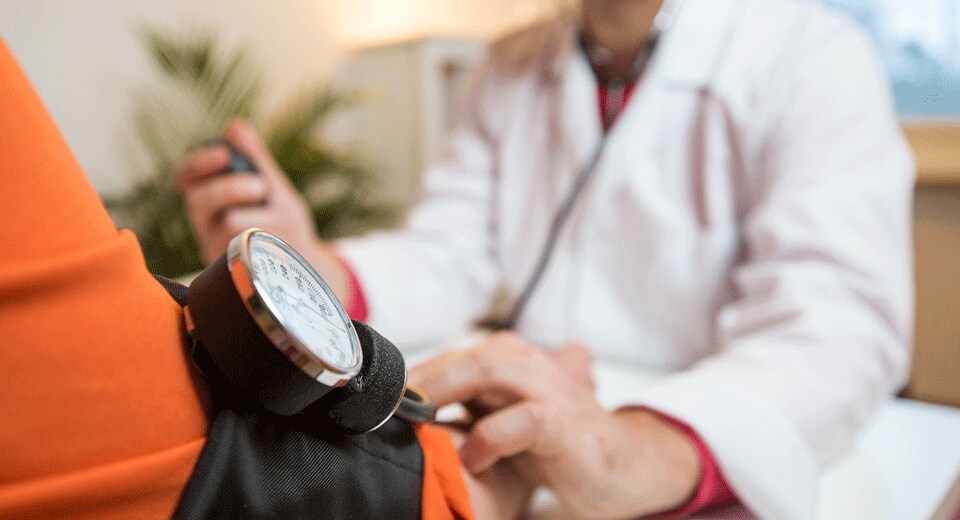Doing this when you’re young can hurt you later in life

About half of adults with high blood pressure in the U.S. do not have their disease under control, according to a new study, which shows that younger patients are particularly non-compliant.
The new study, recently published in the medical journal Hypertension, found that more than half of younger patients (under the age of 65) who were prescribed medications for high blood pressure either stopped taking them within a few months or didn’t take them as prescribed. In the study of more than 370,000 patients, the researchers found that 23.5 percent of the patients stopped taking the medication within the first nine months.
Of those who kept taking the medications, 40 percent took the prescribed medication less than 80 percent of the time.
Those statistics don’t surprise cardiologist Jennifer Ladner, MD, a cardiac hospitalist at Cape Cod Hospital. She said there are several reasons that may explain why some younger people don’t take their blood pressure meds.
“Younger people tend to be healthier in general,” she said. “They don’t feel bad, so they don’t understand why they need to take a medication.
“It’s easy to remember to take a Tylenol when you have a bad headache. But with blood pressure, you don’t feel badly, so you just have to get into the habit of taking the medication.”
Another reason that younger people may not stick with a medication routine is that, in general, they are not used to taking medication, Dr. Ladner said.
“When you are older and already have five to ten medications that you have to take, what difference does it make to add one more? You are already in the habit of taking medicines every morning or evening.”
Blood pressure is called the silent killer for exactly that reason. There are no overt symptoms so it’s an easy health problem to ignore, especially if you don’t make regular visits to the doctor.
Untreated hypertension takes a toll on a person’s health over time and, if left untreated, can lead to the following health complications:
- Kidney problems
- Eye problems
- Atherosclerotic disease in general
- Peripheral vascular disease
- Heart disease
- Cerebral vascular disease
- Dementia
- Stroke
“It’s a pretty big deal,” Dr. Ladner said. “From a long-term prognosis, it makes a big difference if you are young and you have hypertension and you haven’t been taking your medication. If you have untreated hypertension for 10 to 20 years, you can develop one or more of these serious diseases.”
Strategies
Dr. Ladner recommends that patients pick the same time every day to take their medication, like right after breakfast. Buying a pill dispenser also helps people keep track of whether they have taken their medications or not.
The problem with high blood pressure in general is that not only do you usually not feel sick when you have the condition, a lot of the medications come with some side effects that may make you feel worse than the actual hypertension itself, Dr. Ladner said.
“Especially if you are young and physically active, these anti-hypertensive medications make you feel fatigued and sleepy and maybe a little foggy in the brain. That’s also probably a big part of why people don’t take their medication.”
The solution to that problem is to work closely with your primary care doctor to find a medication that works well, with tolerable side effects. It can take diligence on the part of both the patient and the physician, and may include months of trial and error, but the end result is better health in the long run.
For those who are resistant to taking medication, Dr. Ladner suggests talking to your doctor about lifestyle changes you can make that may make medication unnecessary. A few ways to make a noticeable impact on your blood pressure are to:
- Lose weight
- Get regular exercise
- Eat a healthy diet
- Drastically limit salt intake
Make a deal with your doctor to try lifestyle changes for one month to see if you can lower blood pressure by changing your habits. If the lifestyle changes don’t help, medication is the only solution.
When Dr. Ladner was in private practice, she always recommended that her patients buy a blood pressure cuff to use at home to monitor their blood pressure.
“If the patient is actively engaged in their own treatment, they can see the benefits of what they are doing and the result of taking their medication or exercising or following a low-salt diet,” she said.
